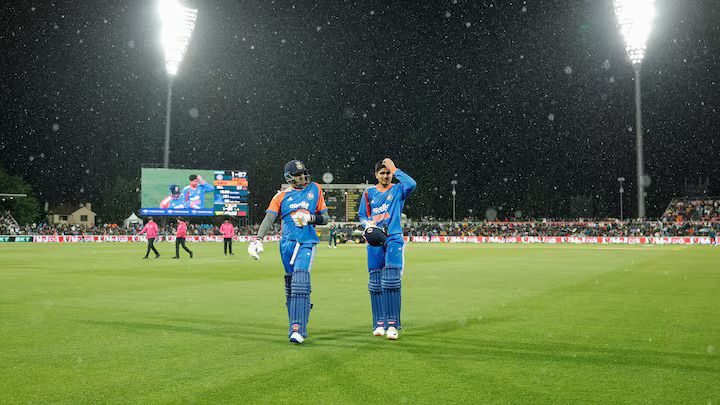
The lack of super soppers and adequate equipment to deal with drizzle, along with Canberra’s unique “lights out” regulation, led to the opening T20I of the five-match series between India and Australia being called off. Despite a short 20-minute, light drizzle break after the end of the fifth over, the match was initially reduced to 18 overs. The second rain break, which lasted around 50 minutes, led to the cancellation of the entire game, frustrating fans and experts.
In the backdrop of a strange rule in the city, Manuka Oval is subject to a strict floodlight curfew where all lights must be switched off by 11pm local time. The rule exists because the stadium is located near residential areas, and it isn’t a city-wide restriction.
This curfew forced match officials to recalculate playing time after the first rain break before calling the game off during the second rain break, as the lights would have automatically shut down due to the existing rule. Despite many requests from the Manuka Oval management to tweak the Environmental Protection Act in the past, the rule continues to exist, forcing the timings of big-ticket matches to be rushed. It was a sold-out crowd at Manuka Oval, and fans left in frustration after the match was called off.
Moreover, during both breaks, especially the second one, which was slightly longer with the drizzle being on the heavier side, the lack of super soppers at the venue also led the officials to call off the match. Had the venue been equipped with the required equipment, officials could have pushed for a five-over game.
Furthermore, the four travelling Indian media personnel had to face extremely rude and unprofessional behaviour from one of the female staff members, perhaps a security personnel, present at the press box. The Indian team had left the venue at around 10:45 PM amid massive fanfare outside the exit gate. Since one video journalist from one of the largest news agencies in India and the world was here to cover the series, he was out there to capture the departure shots.
To send those visuals to his office headquarters in India, he required a stable internet connection. However, upon reaching the press box, at 11PM, he found all his bags kept in the dining lounge, with the above-mentioned female staff asking him to vacate the space immediately. Despite requesting that he needed just 10 minutes to send the visuals, he, along with the other three travelling Indian media personnel, were hurriedly escorted out of the venue. When requested for a bottle of water before leaving the press box, the concerned lady rudely said ‘no’, but to the credit of other Cricket Australia staff, a couple of water bottles were provided. The aforesaid video journalist had to stand outside the main gate in temperatures hitting single digits. While he was working outside the main gate amid cold and wind, many other staffers were seen leaving the venue even at least 20 minutes later. Cricket Australia has been really helpful to the travelling Indian media during the ongoing white-ball series, but such isolated behaviours put a blot on their reputation.
Furthermore, there were incidents outside the main gate where a few people had sold a single-digital ticket to multiple fans, creating a bit of confusion near the entry gate after the scanners failed to recognize the QR codes. Those who were duped were furious as they had come along with friends and families to catch their favourite stars in action. While Manuka Oval is not a major cricketing venue like the MCG, SCG, or the Gabba, fans would hope for better equipment in case of rain-affected games and efficient ticket management, whereas the travelling media would hope they don’t face such isolated cases in the future.



